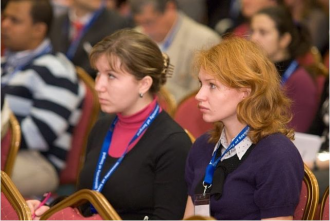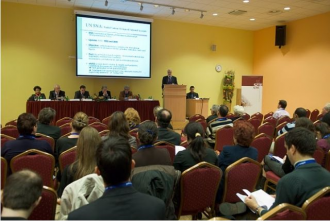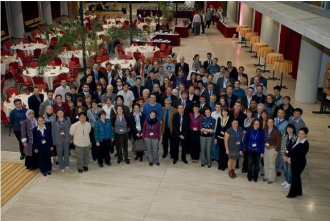Szegedi Tudományegyetem - Ahol tudás és szándék találkozik
 Régi doktori képzéses anyagok
Régi doktori képzéses anyagok
Chair: Prof. Imre Lengyel DSc
Institute of Finance and International Economic Relations
H–6722 Szeged, Kálvária sgt. 1., Hungary
Phone: +36 (62) 544-678,
E-mail: ilengyel@eco.u-szeged.hu
http://www.eco.u-szeged.hu/english/phd-school-in-economics/phd-school-in-economics
Co-operating institutions
Institute of Economics of the Hungarian Academy of Sciences
http://www.econ.core.hu/english/
Financial Research Plc.
IKU Innovation Research Centre
http://www.penzugykutato.hu/en/node/325
 Answering theoretical and practical questions related to the operation of the economy has necessitated increasingly complex approaches in the past decades. Exploring the most important socio-economic problems of our times and providing support to meet all challenges require solutions that presuppose the adoption of knowledge acquired in other fields of science.
Answering theoretical and practical questions related to the operation of the economy has necessitated increasingly complex approaches in the past decades. Exploring the most important socio-economic problems of our times and providing support to meet all challenges require solutions that presuppose the adoption of knowledge acquired in other fields of science.
The science of economics is capable of developing a fruitful relation with numerous peer sciences. During the development of the research and training structure of the PhD programme, the teaching researchers and institute employees of the Faculty strived to find the most important topics related to fields of sciences that could constitute a starting point for providing answers to current economic issues in the centre of general interest.
The school has two programmes the World Economy and International Finances and Regional Economic Development Research Workshop.
World Economy and International Finances program will be commenced in English for the interest of foreign students who get admission to the Doctoral School.
Students choose first a program, and within the program they can specialize according to workshops. In the fourth semester students will continue their studies in workshops.
Due to specialisation and optional classes, students can select the subjects and fields of research (workshops) as the training field of their PhD education that best fit their individual research topics and habits.
Within the framework of the offered courses students must accomplish general and workshop-specific courses. In addition, they also have to take part in workshop-research. The aim of the Ph.D. program is to qualify candidates for individual scientific research and make them well-qualified persons with a variety of accomplishments.
Educational Programmes
1. World Economy and International Finances
Programme director: Prof. Katalin Botos DSc
Institute of Finance and International Economic Relations
H–6722 Szeged, Kálvária sgt. 1., Hungary
Phone: (+36 62) 544 632, Phone/Fax: (+36 62) 544 499
E-mail: kabor@t-online.hu
(A) The role of the state in contemporary world Research workshop
Coordinator: Prof. Katalin Botos DSc
Research topics
– Agricultural Policies from the point of view of the World Economy (Iván Benet CSc)
– The Relationship between Economic Growth and Ageing Society (Katalin Botos DSc)
– Imbalance and Ageing in the Upward Striving Markets (Katalin Botos DSc)
– The Reform of International Monetary Institutions, the International Function of the Euro (Katalin Botos DSc)
– Function of the State (Katalin Botos DSc)
– Comparing the Conversion of the Russian and the Chinese Political and Economic Systems (Mária Csanádi DSc)
– Economic Growth and its Components (Péter Csillik PhD)
– The European Social Model and the Lisbon Process (Beáta Farkas PhD)
– Money, identity and “money magic” (Szilvia Szegő CSc)
– Distribution Methods of the European Union Subsidies and its Effects in Hungary (Éva Voszka DSc)
– Conditions of Liberalisation and its Consequences (Éva Voszka DSc)
– The Effect of Privatisation on the Terms of Competition in Hungary (Éva Voszka DSc)
 (B) Economic Psychology Research Workshop
(B) Economic Psychology Research Workshop
Coordinator: Prof. Balázs Hámori CSc
Department of Economic Psichology
H–6722 Szeged, Kálvária sgt. 1., Hungary
Phone: (+36 62) 544 146, Phone/Fax: (+36 62) 544 499
E-mail: bhamori@uni-corvinus.hu
Research topics
– Behavioural Finance in the Field of Corporate Finance (Balázs Hámori CSc)
– Tax evasion, tax-payment repudiation, motivation and techniques. The development of tax-payment behaviour (Balázs Hámori CSc)
– The Role of Emotions, Passion, Attitudes and Motivation in Economic Processes and Decisions(Balázs Hámori CSc)
– Personal, Social and Institutional Conditions of Competitiveness(Balázs Hámori CSc)
(C) Economic Mathematics Research Workshop
Coordinator: Prof. András Krámli DSc
Department of Stochastics
H–6720 Szeged, Aradi Vértanúk tere 1., Hungary
Phone: (+36 62) 544 698, Phone/Fax: (+36 62) 544 548
E-mail: kramli@informatika.ilab.sztaki.hu
Research topics
– Physical Analogies in Financial Mathematics (András Krámli DSc)
– The Application of the latest Methods of Time Series Analysis in the Study of Economic Processes (András Krámli DSc)
2. Enterprise and Regional Development Program
Coordinator: Prof. Imre Lengyel DSc
H–6722 Szeged, Kálvária sgt.1., Hungary
Phone: (+36 62) 544 678, Phone/Fax: (+36 62) 544 499
E-mail: ilengyel@eco.u-szeged.hu
Research topics
– Information System of Science, Technology and Innovation Politics (Annamária Inzelt DSc)
– Innovation politics (Annamária Inzelt DSc)
– The Knowledge-spreading Ability of the Hungarian National Innovative System from an International Point of View (Annamária Inzelt DSc)
– Interpretation of Distance and Proximity in Knowledge-Intensive Business Spheres (Imre Lengyel DSc)
– Principles of Spatial Concentration Theories in Regional and Urban Economics (Imre Lengyel DSc)
– Cluster-based regional economic development (Imre Lengyel DSc)
– Regional Economic Development: Improving Competitive Power in Differently Developed Regions (Imre Lengyel DSc)
 Courses (compulsory or voluntary) in all workshops
Courses (compulsory or voluntary) in all workshops
– Micro-economics (Péter Csillik CSc)
– Macro-economics (Dietmar Meyer DSc)
– Practical Mathematics (András Krámli DSc)
– Research Methodology (Katalin Szabó DSc)
– Probability Calculus and Mathematic Statistics (László Viharos PhD)
– Finances (Katalin Botos DSc)
– Statistics (Tibor Petres PhD)
– Regional Economics (Imre Lengyel DSc)
– Measuring the Redundancy of Data Files (Tibor Petres PhD)
– Sustainable Development (Stefan Brunnhuber PhD)
– Economic Psychology (Balázs Hámori CSc)
– The Philosophy of Economics (Beáta Farkas CSc)
– Marketing Research (Zoltán Veres CSc)
– Introduction to Exchange Mathematics (András Krámli DSc)
– Dynamic Economic Models (Géza Makay CSc)
– The Economy of the European Union (Beáta Farkas CSc)
– The History and Philosophy of Finance (Katalin Botos DSc)
– International Finances (Katalin Botos DSc)
– Finances and Growth (Péter Csillik CSc)
– Financing a Career (Szilvia Szegő CSc)
– Reappraisal of Micro-economics (Katalin Martinás PhD)
– General Psychology (Ágnes Szabó)
– The Methodology of Psychology (Attila Krajcsi PhD)
– Social Psychology (Ágnes Szabó)
– Behavioural Economics (Balázs Hámori CSc)
– Special Economic Psychology (Balázs Hámori CSc)
– Work Psychology (Ágnes Szabó)
– Organisational Psychology (Éva Málovics PhD)
– Regional Economic Development (Imre Lengyel DSc)
– Local Economy and Enterprise Development (Imre Lengyel DSc)
– Agricultural Strategies in World Economy (Iván Benet CSc)
Representative dissertations (title, author, supervisor, year):
- Transaction costs: optimum, economies of scale and equilibrium László Kállay, Imre Lengyel, 2005.
- Supporting the networking of SMEs as a special form of enterprise development, Szabolcs Imreh, Imre Lengyel, 2006
- The role of business angels in financing and developing of growth-oriented SMEs, Andreász Kosztopulosz, Botos Katalin,2006
- Analysis of competitiveness of local areas, Miklós Lukovics, Imre Lengyel, 2007
- Creditworthy and real understanding of business processes in the context of Hungarian and international accounting standards, István Deák, Ágnes Laáb, 2007
- The possibilities of clusters in less developed regions: examples from the South Great Plain Region, Réka Patik, Imre Lengyel, 2007
- Theory and utilization of technological incubation in underdeveloped regions in Hungary, Zoltán Bajmócy, Imre Lengyel, 2007
- Risks arising from local governments' financial status and assets in Hungary, Péter Halmosi, András Vigyári, 2007
- e-HRM: electronical human resource management – the webolution of HR, Zoltán Majó, Gizella Sikora, 2007
- Analysis of multicollinearity in linear regressive models. Analysis of Petres’s RED index, Péter Kovács, Tibor Peters, 2008
- Criterias of students’ satisfaction in mass education, Nikolett Mihály, Károly Barakonyi, 2009
- Protestantism and Capitalism: Lessons from the Economic and Intellectual History of Hungary, György Kovács, Beáta Farkas, 2010
- The role and importance of self-control in intertemporal consumer decisions, László Lippai, Balázs Hámori, 2010
- The economic-psychological analysis of envy Envy in post-socialist society, László Tóth, Balázs Hámori, 2010


 Print article
Print article Send link
Send link Share
Share



